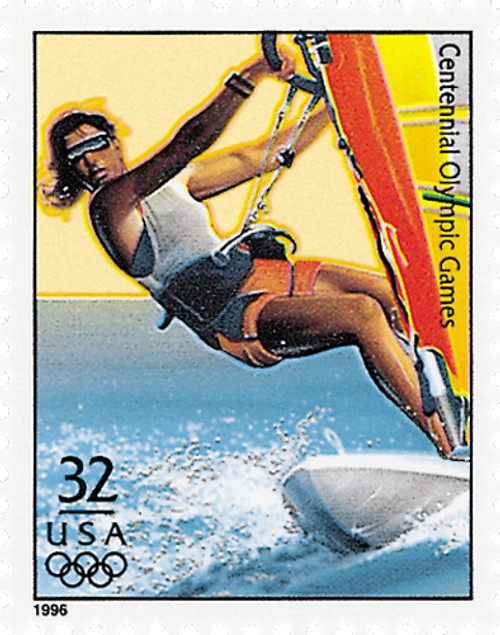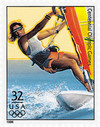
# 3068h - 1996 32c Olympic Games: Women's Sailboarding
US #3068h
1996 Women’s Sailboarding
- Part of Souvenir Sheet of 20
- Sheet commemorates 100th anniversary of Olympics
- Fourth sheet in Classic Collections series
Category of Stamp: Commemorative
Set: Olympic Games
Value: 32¢, First-Class mail rate
First Day of Issue: May 2, 1996
First Day City: Washington, DC
Quantity Issued: 324,150,000
Printed by: J. W. Fergusson and Sons, for Stamp Venturers
Printing Method: Photogravure
Format: Panes of 20 (5 across, 4 down) from cylinders of 120 (8 across, 15 down)
Perforations: 10.1
Reason the stamp was issued: The sheet of 20 stamps was issued in honor of the 100th anniversary of the moder Olympic Games. The Olympics were held in Atlanta, Georgia two months later.
About the stamp design: Artist Richard Waldrep created the paintings used for the stamp images using photographs of athletes performing each sport. He chose sports that America was likely to do well in and those that were the most watched on TV.
Waldrep had previously designed the set of five stamps for the 1992 Summer Olympics and the four Country and Western Music stamps the following year.
Special design details: In some of his designs, Waldrep had to alter the faces and uniforms of the athletes he depicted so they wouldn’t resemble the athlete in the original photos he used for reference.
First Day City: Though the First Day of Issue ceremony was originally supposed to be held in Atlanta, it was changed to Washington, DC, just weeks before the stamp was issued. This was in response to a disagreement between the US Postal Service and the US Olympic Committee over the sale of T-shirts picturing the stamps. The Olympic Committee saw the merchandise as a violation of the marketing agreement between the committee and the USPS.
About the Classic Collections Series: The Atlanta 1996 sheet was the fourth issue in the Classic Collections series. This series began in 1994 with the Legends of the West issue. The idea originated from Carl Burcham, manager of stamp and product marketing for USPS at the time. Each Classic Collections set consists of a pane of 20 different semi-jumbo stamps with descriptive selvage at the top (header) and informational text on the back of each stamp beneath the gum. The stamps are “broadly defined, Americana-themed subjects.”
The first four Classic Collections sets were accompanied by matching sets of picture postal cards showcasing the stamp designs.
History the Souvenir Sheet represents: The 1996 Olympic Games marked an important anniversary – 100 years since the start of the modern Olympic Games. The Ancient Olympic Games were held between 776 BC and 394 AD, when Theodosius I abolished them.
More than 1,500 years later, Pierre de Coubertin arranged for the first modern Olympics to be held in 1896. He believed that friendly athletic competition could promote world peace. Those first games consisted of 285 athletes, representing 13 nations, competing in 42 events. The games were a success and became an international tradition.
One hundred years later, the world excitedly prepared for the 1996 Olympic Games. The games opened on July 19, 1996, in Atlanta, Georgia. Some 11,000 athletes from 197 nations competed in hundreds of events.
The US issued two items for the occasion. One was a sheet of 20 stamps (#3068), released in May, that depicted modern athletes. The other was issued on the opening day of the show and honored the games’ centennial. This stamp (#3086) pictures the “Discus Thrower” – the king of athletes among ancient Greeks – whose purposeful action is captured in Myron’s 5th-century B.C. statue Discobolus.
Women’s Sailboarding History: In the four years between the 1992 and 1996 games, the sport of Olympic yachting underwent rapid changes both in style and format. Gone were the courses which allowed competitors to spread out – sometimes miles apart. As a result, participants now compete on tightly angled triangular or trapezoid-shaped courses, performing a series of loops around inflatable marker buoys. Success in these shorter races depends on a strong start, good acceleration, consistent speed, and sharp tactical skills.
New for the 1996 Olympic Games, these courses set the scene for some stiff competition, but nowhere more so than in the boardsailing event. The introduction of unlimited “pumping” or fanning of the sail, which increases speed substantially, turned the competition into a battle of aerobic fitness, as well as sailing skill.
Men’s boardsailing was first introduced in 1984, and in 1992, women’s boardsailing made its debut. Competitors use a sailboard – a “surfboard” with a mast and sail. Controlling the rig with the arms and steering from a standing position with bodyweight and movement, the athlete becomes an integral part of the craft. Each nation selects only one entrant and all equipment (board and rig) is supplied by the Olympic committee.
US #3068h
1996 Women’s Sailboarding
- Part of Souvenir Sheet of 20
- Sheet commemorates 100th anniversary of Olympics
- Fourth sheet in Classic Collections series
Category of Stamp: Commemorative
Set: Olympic Games
Value: 32¢, First-Class mail rate
First Day of Issue: May 2, 1996
First Day City: Washington, DC
Quantity Issued: 324,150,000
Printed by: J. W. Fergusson and Sons, for Stamp Venturers
Printing Method: Photogravure
Format: Panes of 20 (5 across, 4 down) from cylinders of 120 (8 across, 15 down)
Perforations: 10.1
Reason the stamp was issued: The sheet of 20 stamps was issued in honor of the 100th anniversary of the moder Olympic Games. The Olympics were held in Atlanta, Georgia two months later.
About the stamp design: Artist Richard Waldrep created the paintings used for the stamp images using photographs of athletes performing each sport. He chose sports that America was likely to do well in and those that were the most watched on TV.
Waldrep had previously designed the set of five stamps for the 1992 Summer Olympics and the four Country and Western Music stamps the following year.
Special design details: In some of his designs, Waldrep had to alter the faces and uniforms of the athletes he depicted so they wouldn’t resemble the athlete in the original photos he used for reference.
First Day City: Though the First Day of Issue ceremony was originally supposed to be held in Atlanta, it was changed to Washington, DC, just weeks before the stamp was issued. This was in response to a disagreement between the US Postal Service and the US Olympic Committee over the sale of T-shirts picturing the stamps. The Olympic Committee saw the merchandise as a violation of the marketing agreement between the committee and the USPS.
About the Classic Collections Series: The Atlanta 1996 sheet was the fourth issue in the Classic Collections series. This series began in 1994 with the Legends of the West issue. The idea originated from Carl Burcham, manager of stamp and product marketing for USPS at the time. Each Classic Collections set consists of a pane of 20 different semi-jumbo stamps with descriptive selvage at the top (header) and informational text on the back of each stamp beneath the gum. The stamps are “broadly defined, Americana-themed subjects.”
The first four Classic Collections sets were accompanied by matching sets of picture postal cards showcasing the stamp designs.
History the Souvenir Sheet represents: The 1996 Olympic Games marked an important anniversary – 100 years since the start of the modern Olympic Games. The Ancient Olympic Games were held between 776 BC and 394 AD, when Theodosius I abolished them.
More than 1,500 years later, Pierre de Coubertin arranged for the first modern Olympics to be held in 1896. He believed that friendly athletic competition could promote world peace. Those first games consisted of 285 athletes, representing 13 nations, competing in 42 events. The games were a success and became an international tradition.
One hundred years later, the world excitedly prepared for the 1996 Olympic Games. The games opened on July 19, 1996, in Atlanta, Georgia. Some 11,000 athletes from 197 nations competed in hundreds of events.
The US issued two items for the occasion. One was a sheet of 20 stamps (#3068), released in May, that depicted modern athletes. The other was issued on the opening day of the show and honored the games’ centennial. This stamp (#3086) pictures the “Discus Thrower” – the king of athletes among ancient Greeks – whose purposeful action is captured in Myron’s 5th-century B.C. statue Discobolus.
Women’s Sailboarding History: In the four years between the 1992 and 1996 games, the sport of Olympic yachting underwent rapid changes both in style and format. Gone were the courses which allowed competitors to spread out – sometimes miles apart. As a result, participants now compete on tightly angled triangular or trapezoid-shaped courses, performing a series of loops around inflatable marker buoys. Success in these shorter races depends on a strong start, good acceleration, consistent speed, and sharp tactical skills.
New for the 1996 Olympic Games, these courses set the scene for some stiff competition, but nowhere more so than in the boardsailing event. The introduction of unlimited “pumping” or fanning of the sail, which increases speed substantially, turned the competition into a battle of aerobic fitness, as well as sailing skill.
Men’s boardsailing was first introduced in 1984, and in 1992, women’s boardsailing made its debut. Competitors use a sailboard – a “surfboard” with a mast and sail. Controlling the rig with the arms and steering from a standing position with bodyweight and movement, the athlete becomes an integral part of the craft. Each nation selects only one entrant and all equipment (board and rig) is supplied by the Olympic committee.











